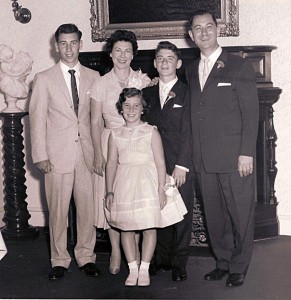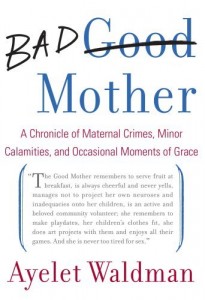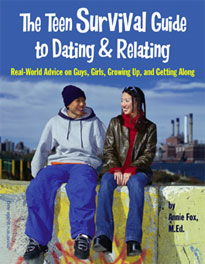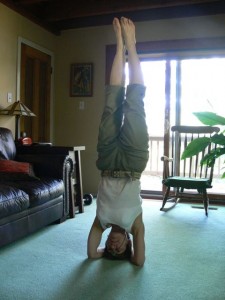|
|
October 14, 2009
 As we were in 1959 Today I interviewed Rachel Simmons for my podcast series: Family Confidential: Secrets of Successful Parenting. (No, it’s not posted yet. Gimme a week or two, ok?) We talked about her must-read new book The Curse of the Good Girl: Raising Authentic Girls with Courage and Confidence and about emotional intelligence. For me, EI (aka EQ) is the ability to:
- identify what you’re feeling
- accept the emotion as it is (without editorializing about your right to feel it)
- express emotion in responsible ways to people who need to hear what you have to say
I’ve immersed myself in this stuff for decades and love talking with people like Rachel, who’ve also made EI their life’s work.
After the interview I recalled a 2003 keynote speech I delivered in Los Angeles. The title: Why 21st Century Kids Need 21st Century Parenting. This feels as good a time as any for a revisit. Here’s a excerpt:
Before we were parents we had parents. People who showed us what it took to be a mom and a dad.
I woke up one morning when I was 5 and heard my mother sobbing behind the door of her room, my father comforting her. My brothers told me that Grandpa had died. A while later, Mom emerged, hair freshly brushed, lipstick bright red. She cheerfully asked what I wanted for breakfast. I wasn’t hungry, I was confused. I wanted to ask about Grandpa, but Mom’s tight smile warned me not to say anything that might upset her. While I pushed a piece of French toast around my plate I had a realization–an absolute epiphany: To be a grown-up means that you have to hide your sadness!
When I was 15 my father died suddenly of a heart attack. His passing left a huge hole in my heart, but instead of grieving I did what I thought grown-ups do, I suppressed my sadness.
Fast-forward 25 years. I’m in the dentist’s chair getting a replacement for an old childhood filling. The doctor pauses in the procedure, gently rests a hand on my head and asks how I’m doing. At his touch a tidal wave of sadness overwhelms me and I start weeping. For the next 48 hours I’m emotionally numb and clueless about what the hell is happening.
David helped me realize that the dentist’s touch had reminded me of my father, who often tousled my hair. With that revelation, the floodgates burst… finally I was able to grieve for my dad. And through my expression of loss I released myself from feelings which held me hostage for decades.
That day I learned about the power of unexpressed emotions. They don’t actually ever go away. Instead, they work like a mild acid, slowly eroding your insides, boring holes in your emotional foundation, creating gaps in your ability to connect with others. I decided not to ever bury feelings that need to be expressed. I vowed to teach my children, through my own example, to express their emotions in healthy ways.
I got my chance soon enough. During most of 1994 my mom was dying of Lou Gehrig’s Disease. Every day I drove an hour each way to visit her. During endless games of Scrabble we finally found the words to communicate with an intimacy we’d never shared before. I am eternally grateful for those last 10 months we had together… grace-filled and excruciatingly painful as they were.
After spending the day with Mom I’d arrive home each night to my own family, scared, stressed, worn down and so raw. I offered no one a lipstick smile. Instead, I trusted that our daughter and son (then ages 15 and 9) would know how to respond to a person in need. And they did. Their backrubs, cups of tea and loving words of encouragement got me through that endless year. I don’t know how I’d have coped if not for David and our sweet kids. If I’d chosen to play the game of “Everything’s fine, honey” I’d have betrayed myself and robbed my children of an opportunity to learn what it means to be a real human being. By sharing the truth of my emotional experience I gave them the chance to exercise their compassion (toward me and their grandmother) and to grow beautifully toward adulthood.
For years we’re on the receiving end of our parents’ choices, observing closely everything they do. As little children we accept that they knew best about what we need. As teens we wonder if they’ve got a clue about who we were or how to parent. After all that watching and evaluating and on the job training with kids of our own, at this point, what could we possibly not know about being a parent?
We know it all, right?

October 5, 2009
 Bad Mother by Ayelet Waldman You’re among friends, so you might as well admit it. When the headlines, cable TV and the blogosphere scream about a bad mother, famous or not, we can’t get enough. And who’s most intent on sucking the marrow out of these kinds of stories? Mothers, of course! We just can’t resist women like Andrea Yates who in the throes of post partum depression, drowned her children in the bathtub. Or Susan Smith who drove hers into a lake allegedly because the man she was dating didn’t like kids. (I’ve wickedly included the links to illustrate how impossible it is not to feed our need to join the Bad Mother Police.)
What’s our fascination with the “bad mother”? Are we’re secretly gloating underneath our horror and disbelief? Do their reprehensible acts make us feel better about the kind of mothers we are?
Maybe the truth is that we’re so uncertain about our ability to measure up to the mythic “Good Mother” that we readily point to the worst mother model around just to give ourselves a little ego boost. “At least I’m not that bad.” And if we really are that insecure about our parenting, how did we get that way? And more to the point, how can we lighten up on ourselves and other women every time a kid has a meltdown in the supermarket?
In this week’s podcast I talk with Ayelet Waldman, author of Bad Mother: A Chronicle of Maternal Crimes, Minor Calamities, And Occasional Moments of Grace.
Back in March 2005 Ayelet wrote an essay for the NY Times in which she stated: “If a good mother is one who loves her child more than anyone else in the world, I am not a good mother. I am in fact a bad mother. I love my husband more than I love my children.”
Today we’re talking with Ayelet about that breakthrough essay, the immediate firestorm it triggered, and where American mothers seem to be today.
Have a listen here:
[QUICKTIME http://www.anniefox.com/podcast/FC009.m4a 300 300 false true]
If you have iTunes, you can subscribe to this podcast in the iTunes Store.
Or, you can download an MP3 version here.
Upcoming guests include:
Rachel Simmons, author of The Curse of the Good Girl: Raising Authentic Girls with Courage and Confidence
Rosalind Wiseman, author of Queen Bees & Wanna Bees and Queen Bee Moms & Kingpin Dads
Diane Peters Mayer, author of Overcoming School Anxiety
Izzy Rose, author of The Package Deal: My (not-so) Glamorous Transition from Single Gal to Instant Mom
Diane E. Levin, co-author (with Jean Kilbourne) of So Sexy So Soon: The New Sexualized Childhood And What Parents Can Do to Protect Their Kids
Susan M. Heim, author of It’s Twins! and Chicken Soup for the Soul Twins and More
Hannah Friedman, author of Everything Sucks: Losing My Mind and Finding Myself in a High School Quest for Cool
Dara Chadwick, author of You’d Be So Pretty If…
*What’s a podcast? “A podcast is a series of digital media files, usually either digital audio or video, that is made available for download via web syndication.” –Wikipedia… So, in this case, there’s an audio file for you to listen to (in addition to reading the above).

October 1, 2009
 It's all about healthy relationships (the only kind worth having) We launched TheInSite in June 1997. From Day One Hey Terra received relationship questions from tweens and teens around the world. Twelve years later the email keeps coming. Pretty amazing this Internets!
After a couple of years of responding to this stuff every day, I decided to write a relationship book for teens. Can You Relate? was published in 2000. It’s my take on how to create and maintain healthy relationships with everyone in your life, including yourself. It got great reviews. Five years later it was re-released as The Teen Survival Guide to Dating and Relating. It went out of print in 2008.
David and I played around with the idea of reprinting it ourselves for sale. But then, last month, thanks to Chris Anderson‘s influence, I decided to give my book away as a FREE download. No strings attached. You don’t even have to provide your email address, though I am partial to dark chocolate so if you wanted to send me a Panther Bar I wouldn’t be insulted.
Giving things away for free is not usually the way companies like to do business. That’s why I’m giving a big shout out to Free Spirit Publishing for being so supportive of this wacky idea. Shows what cool people they are. Check out their website. They publish great books for kids, teens, parents and teachers.
Anyway, here’s the entire volume of Teen Survival Guide to Dating and Relating. Everything your tweens and teens need to know about about guys, girls, growing up, and getting along. Give it to them with my compliments. Hopefully they’ll read it and think about how the situations and the advice apply to them. They might even remember the stuff that resonates and use it someday when they need it.
One more thing, if you’ve got friends with teens or tweens, pass on the free download link to them. That’s what friends are for.

September 28, 2009
 Compared to controlling your mind, this is easy! Thankfully, our kids survived their teen years. So did David and I, though I know I aged more than he did. But I can still do a headstand, so there.
Nail me for sexism, but I’m convinced we moms feel our kids’ challenges more than dads. Everything from circumcision, to vaccinations, to teething, to leaving a tearful kid with a sitter, to friendship issues, to acne, to failed drivers’ tests, to breakups, to college rejections and the rest. We suffered while we were teens, and we moms are genetically predisposed to put ourselves through the wringer with each of our kids. How unfair is that? I have no solution, but I’ve told David that the next life time we’re together, he gets to be the mom.
Since both our daughter and son are out in the world doing very well, thank you, I thought it might be fun (in a masochistic kinda way) to revisit some of my biggest worries during their teens years. Why? I’m bored. Not really, but I am creatively dodging some other work at the moment. Also, I decided to take up this exercise to prove to myself what a futile endeavor all that worrying turned out to be.
Stuff I Wish I Hadn’t Bothered Worrying About
- How will my kid ever make it with his/her self-centered, obnoxious, overly dramatic attitude? Nobody but a parent would put up with this and even we can’t take it!
- Who will ever want to live with my kid? You can’t even walk in the room there’s so much crap on the floor. And (s)he doesn’t even seem to notice!
- How will my kid ever graduate high school? (S)he racks up more time talking to friends/playing video games/sleeping than there are hours in the day.
- How will my kid get through college? Assuming (s)he gets in somewhere. (S)he is a world class procrastinator who can’t get anywhere on time.
- What if some spaced out driver runs a red light and hits my kid while walking, riding his/her bike/driving to school?
- What if my kid feels pressured to do something that (s)he knows isn’t right? Does my kid have what it takes to stick to their values?
- What if my kid gets (someone) pregnant?!
- How can I protect my kid when (s)he isn’t right here with me all the time any more?
I’m not saying these aren’t significant, even worthy, issues for any parent to worry about. But I know for a fact that not one single moment of worrying on my part has ever prevented anything bad from happening to anyone I love. Nor has my worrying ever gotten anyone to modify their behavior into something more to my liking. It just doesn’t work. It’s an utter waste of time. An emotional and mental energy sink. Oh yeah, and it causes stress, aging and lactose intolerance. Not 100% sure about that last one, but you get the idea. No good comes from worrying. And yet… letting go of worrisome thoughts isn’t easy. Especially for parents. Make that double for moms. Learning to do a headstand is way simpler.
And for my next trick… The Amazing Worry-free Mom. (Someday, please.)
 — Older Posts »
| |















